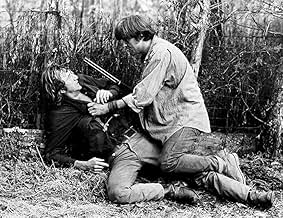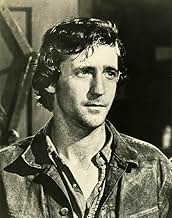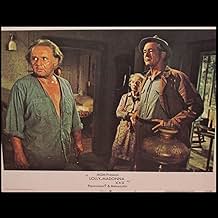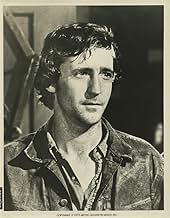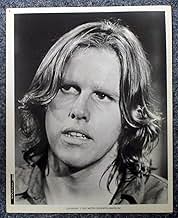IMDb RATING
6.4/10
959
YOUR RATING
In the early 1970s, a young woman passing through rural Tennessee unintentionally gets caught in a feud between two local neighboring clans, the Feathers and the Gutshalls.In the early 1970s, a young woman passing through rural Tennessee unintentionally gets caught in a feud between two local neighboring clans, the Feathers and the Gutshalls.In the early 1970s, a young woman passing through rural Tennessee unintentionally gets caught in a feud between two local neighboring clans, the Feathers and the Gutshalls.
Kathy Watts
- Lyda Jo Gutshall Feather
- (uncredited)
Featured reviews
Two rustic families, headed by patriarchs Laban Feather (Rod Steiger)and Pap Gutshall (Robert Ryan), begin a feud. At first, it is comical, with the sons of the two families playing tricks on each other. One such trick gives the Feather boys the idea to kidnap a girl, who turns out to be innocent bystander Roonie, not the made-up girlfriend named Lolly Madonna. As events escalate, Jeff Bridges' character, Zack Feather, and Roonie fall in love and try to bring the others to their senses. What Roonie doesn't know is that Zack has a dark secret, which will explain why there is much real pain between the two families that once were close friends.
The plot really pushes forward in this movie, which I believe is in part an allegory for the mindlessness of war in general, and for Vietnam in particular (the Paris Peace Talks were about to start when the movie was released). The touching performances make you feel for and care about every character, from wannabe "Elvis" Hawk Feather (Ed Lauter) and his sensitive brother, Thrush Feather (Scott Wilson), both patriarchs, each with a different cross to bear, to the patient, wise, quietly suffering matriarchs (Tresa Hughes and Katherine Squire). Relative newcomers Jeff Bridges, Gary Busey and Season Hubley bring focus and hope to the film. Even the simple melodic score is perfect, coming forward at just the right time.
"Lolly-Madonna XXX" brings tears to my eyes every time I see it... and I'm no wimp!
The plot really pushes forward in this movie, which I believe is in part an allegory for the mindlessness of war in general, and for Vietnam in particular (the Paris Peace Talks were about to start when the movie was released). The touching performances make you feel for and care about every character, from wannabe "Elvis" Hawk Feather (Ed Lauter) and his sensitive brother, Thrush Feather (Scott Wilson), both patriarchs, each with a different cross to bear, to the patient, wise, quietly suffering matriarchs (Tresa Hughes and Katherine Squire). Relative newcomers Jeff Bridges, Gary Busey and Season Hubley bring focus and hope to the film. Even the simple melodic score is perfect, coming forward at just the right time.
"Lolly-Madonna XXX" brings tears to my eyes every time I see it... and I'm no wimp!
Not a film for all tastes. It's violent, almost nihilistic in outcome, and certainly not a classic Hollywood ending. Like some other reviewers, I take the narrative to be an allegory on war, at least of certain types of war. Here a dispute over a lovely Tennessee meadow escalates tragically into a shooting war between two patriarchal families that devastates both clans. Tragically, neither patriarch (Steiger nor Ryan) exercises the kind of leadership to head off the calamitous results. Thus headstrong elements are allowed to operate at gut level instead of anything reasoned, producing tragic results.
Frankly, I'm not sure whether I liked the film or not. Parts are compelling, especially the sensitive romance between Bridges and Hubley. Both are outstanding; in fact Hubley almost made me feel her painful confusion. Also, the beauty of the rolling hills and meadow contrasts creatively with the clans' destructive emotions. Then too, whose inspiration was balding Edd Lauter's secret fantasy to fly away on his tattooed wings to become the next southern Elvis, his chances about as good as mine. And judging from the dilapidated shacks, their time would be better spent fixing up where they dwell instead of taking each other down.
On the movie's downside is the choppy editing that at times makes the storyline hard to follow, especially when the scene shifts from one clan to the other. Thus the threads can at times be hard to follow. Moreover, except for the few romantic interludes, the mood is unrelentingly grim, not exactly an audience come-on. Anyway, Steiger is uncharacteristically restrained, while Ryan doesn't get the screen time his talent deserves. At the same time, a lot of younger talent does get a chance to shine.
All in all, I guess I respect the movie more than I liked it, its moral certainly meriting that kind of consideration.
Frankly, I'm not sure whether I liked the film or not. Parts are compelling, especially the sensitive romance between Bridges and Hubley. Both are outstanding; in fact Hubley almost made me feel her painful confusion. Also, the beauty of the rolling hills and meadow contrasts creatively with the clans' destructive emotions. Then too, whose inspiration was balding Edd Lauter's secret fantasy to fly away on his tattooed wings to become the next southern Elvis, his chances about as good as mine. And judging from the dilapidated shacks, their time would be better spent fixing up where they dwell instead of taking each other down.
On the movie's downside is the choppy editing that at times makes the storyline hard to follow, especially when the scene shifts from one clan to the other. Thus the threads can at times be hard to follow. Moreover, except for the few romantic interludes, the mood is unrelentingly grim, not exactly an audience come-on. Anyway, Steiger is uncharacteristically restrained, while Ryan doesn't get the screen time his talent deserves. At the same time, a lot of younger talent does get a chance to shine.
All in all, I guess I respect the movie more than I liked it, its moral certainly meriting that kind of consideration.
This one starts out like the distant inbred cousin of Deliverance from West Virginia come out on the porch to play the banjo. A menacing beat-up flatbet truck runs circles around a girl killing time in a remote bus stop on her way to Nashville. There's promise of backwoods squalor and meanness and the delivery of it, not exploitation graphic and gratuitous but it's there, the passerby girl is snatched, another girl is raped, a moonshine still is busted, and a backwoods yokel with painted eyes and a bra makes a scene. At that point the Feathers family appears to be only a few generations of inbreeding away from moving down to Texas to make lampshades out of human skin and chase Marilyn Burns with a buzzing chainsaw.
Then, as the two feuding families headed by patriarchs Rod Steiger and Robert Ryan begin to spar about stolen hogs and a postcard written to one Lolly-Madonna and a grassy meadow that at one time belonged to one or the other family, something begins to change like a dark cloud passes over the movie. It's not about the futile anguish and madness of vendetta, although it seems so at first. And it's not about hogs or the grassy meadow or even land as a basic abstraction and what it's come to signify for people who had nothing to call their own for generations but land. It's about the creeping realization of a broken life muttering to itself late at night on a rocking chair by the window that "it's too late", that it's too late not for killing and dying but for even words.
It's about something that happened long ago which can't be made right again, and it has something to do with a son who never came back from the war, about brothers who can never measure up to that son who never came back from the war because they stayed behind, about a dead wife who was more important to the father-in-law than the son who lost her, that much more important that the father-in-law had to sacrifice that which was the most important thing in the life of the other son (the one who never amounted much for anything) to repudiate the killing. And about horses. It's about bitter regret pain and anguish gnawing at the insides and then the grassy meadow is set on fire and the two families meet for a standoff outside the old rundown Feathers home, once probably elegant with wealth happiness and good fortune.
In the end, the look on Rod Steiger's eyes turns from anger and sadness to complete madness and Sarafian gives us freeze frames of the main characters that look like portraits of despair, the colors are drained out and the movie turns sepia yellowish as if in memory of something lost, of that small insubstantial detail that involved horses and the dead wife that was the result not of practical design or coincidence but of the pure blind chance of the cointoss that forever changed the lives of two families. Immense sadness. Or like William Faulkner would say, between grief and nothing, Lolly-Madonna XXX will choose grief.
Then, as the two feuding families headed by patriarchs Rod Steiger and Robert Ryan begin to spar about stolen hogs and a postcard written to one Lolly-Madonna and a grassy meadow that at one time belonged to one or the other family, something begins to change like a dark cloud passes over the movie. It's not about the futile anguish and madness of vendetta, although it seems so at first. And it's not about hogs or the grassy meadow or even land as a basic abstraction and what it's come to signify for people who had nothing to call their own for generations but land. It's about the creeping realization of a broken life muttering to itself late at night on a rocking chair by the window that "it's too late", that it's too late not for killing and dying but for even words.
It's about something that happened long ago which can't be made right again, and it has something to do with a son who never came back from the war, about brothers who can never measure up to that son who never came back from the war because they stayed behind, about a dead wife who was more important to the father-in-law than the son who lost her, that much more important that the father-in-law had to sacrifice that which was the most important thing in the life of the other son (the one who never amounted much for anything) to repudiate the killing. And about horses. It's about bitter regret pain and anguish gnawing at the insides and then the grassy meadow is set on fire and the two families meet for a standoff outside the old rundown Feathers home, once probably elegant with wealth happiness and good fortune.
In the end, the look on Rod Steiger's eyes turns from anger and sadness to complete madness and Sarafian gives us freeze frames of the main characters that look like portraits of despair, the colors are drained out and the movie turns sepia yellowish as if in memory of something lost, of that small insubstantial detail that involved horses and the dead wife that was the result not of practical design or coincidence but of the pure blind chance of the cointoss that forever changed the lives of two families. Immense sadness. Or like William Faulkner would say, between grief and nothing, Lolly-Madonna XXX will choose grief.
This is not a great film, by any means, but they make an honest effort to build up the ridiculous notion of territorial ownership of people, fences, and honor. Robert Ryan (wonderful actor since the 40's) and Rod Steiger (more restrained than usual) are the patriarchs of two rural hillbilly families with an innocent girl standing between them.
Jeff Bridges, Scott Wilson, Gary Busey, and Randy Quaid are some of their brood that puts this slightly above the usual drive-in fare. Kiel Martin is very good. Nice cinematography and none of the cast is coasting, it just never really catches fire. Worth a watch, though. Best performance = Scott Wilson. A 6 out of 10.
Jeff Bridges, Scott Wilson, Gary Busey, and Randy Quaid are some of their brood that puts this slightly above the usual drive-in fare. Kiel Martin is very good. Nice cinematography and none of the cast is coasting, it just never really catches fire. Worth a watch, though. Best performance = Scott Wilson. A 6 out of 10.
I saw this movie on TCM late at night (must be around 2 AM) when I was channel surfing. I was actually intrigued by its title and decided to watch it assuming it was a campy 70's sex romp. But once you see established names like Rod Steiger, Robert Ryan, Jeff Bridges, Randy Quaid, Scott Wilson, Ed Lauter and Gary Busey, you know you are wrong.
Though not everybody's cup of tea, Lolly Madonna XXX is a surprise treat - one of those movies that surprise you just when you think you know whats going to happen next or assume nothings going to happen at all. With terrific performances especially by Ed Lauter, a(very thin looking)Randy Quaid and a very young Jeff Bridges besides a beautiful score thats just right,this is a movie you shouldn't miss.
Though not everybody's cup of tea, Lolly Madonna XXX is a surprise treat - one of those movies that surprise you just when you think you know whats going to happen next or assume nothings going to happen at all. With terrific performances especially by Ed Lauter, a(very thin looking)Randy Quaid and a very young Jeff Bridges besides a beautiful score thats just right,this is a movie you shouldn't miss.
Did you know
- TriviaBased on the 1969 novel, "The Lolly Madonna War," by Sue Grafton, author of the popular "alphabet mysteries" featuring hard-boiled female Private Investigator Kinsey Millhone. The twelfth installment, "'L' is for Lawless," was published in the United States in 1995.
- Quotes
Sister E. Gutshall: [to Hawk's made-up face] Indian chief my foot! You look like a shitty little queer!
- Alternate versionsThe film originally received an "R" rating from the MPAA due to the violence, which was later trimmed to receive a "PG" rating. The details removed from the "R" version include a brief Season Hubley nude scene, and "toning down" of the violence, especially the scene in which "Laban" kicks "Thrush" to death. Most critics saw the "R" version.
- ConnectionsFeatured in The Moviemakers (1973)
- How long is Lolly-Madonna XXX?Powered by Alexa
Details
Contribute to this page
Suggest an edit or add missing content


